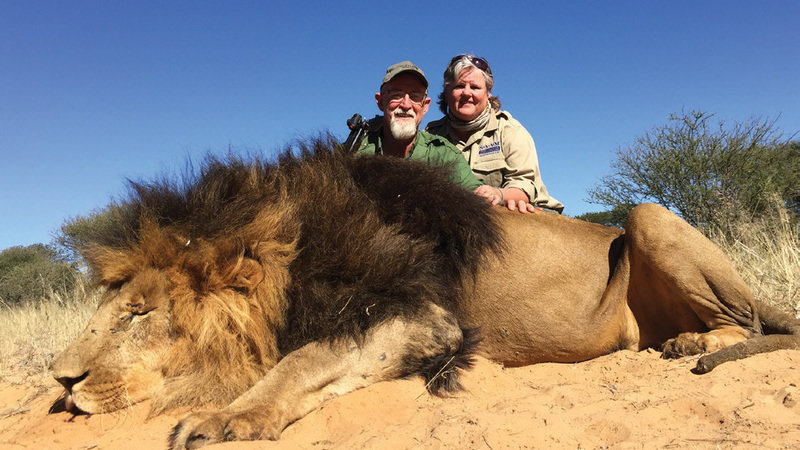- About
- Topics
- Picks
- Audio
- Story
- In-Depth
- Opinion
- News
- Donate
- Signup for our newsletterOur Editors' Best Picks.Send
Read, Debate: Engage.
| November 27, 2019 | |
|---|---|
| topic: | Hunting & Poaching |
| tags: | #Change.org, #Africa, #trophy hunting, #mass extinction of species, #petition |
| located: | Botswana, Zimbabwe, Mozambique, Zambia, Tanzania, Namibia, South Africa, USA |
| by: | Yair Oded |
While pollution and degradation of natural resources account for the bulk of human activities resulting in mass extinction of species, hunting and poaching of wild animals across Africa by westerners exacerbate the strain on global biodiversity, destroy natural habitats, and further reduce populations of endangered species.
A Change.org petition launched by India Doris calls on the African Union and several African governments, including Mozambique, Namibia, Tanzania, South Africa, Zambia and Zimbabwe, to ban trophy hunting in their territories. The petition has so far garnered over 29,500 signatures out of its goal of 35,000.
Over the years, myths circulated regarding the supposed benefits of hunting and poaching, with proponents of the practice arguing that the industry rakes in revenue used to support the local communities and finance wildlife conservation efforts and keeps animal populations under control. Others, such as many in Zimbabwe, ascribe hunting to long-standing cultural traditions, and maintain that trophy hunting can be done responsibly and sustainably.
This largely false narrative clearly eases the conscience of avid trophy hunters coming to Africa from the west to engage in what they find to be an exhilarating ‘sport’. In reality, however, hunting and poaching exert extensive damage on the environment with little to no benefit to the local communities in areas where hunting takes place.
Numerous reports, including by the BBC and National Geographic, reveal that, contrary to popular belief, a negligible amount of the tens of thousands of dollars garnered by companies organising trophy hunting tours are funnelled to the local population and conservation efforts.
“If hunters are coming in from all around the world, and you’re really pumping money earned from trophies back into conservation and anti-poaching, where have all the elephants gone?” asks Katarzyna Nowak, a conservation scientist associated with the University of the Free State, Qwaqwa, in South Africa, in an interview for National Geographic.
Trophy hunting has also reportedly contributed to endemic corruption across southern Africa, as the authorities often turn a blind eye when wealthy hunters violate hunting regulations by hunting in restricted areas or killing protected animals.
Yet the most severe outcome of trophy hunting is the enormous damage it inflicts on wildlife population and its role in exacerbating extinction of species.
According to a 2016 report by Great Elephant Census, Africa had only 352,271 elephants left in 93 per cent of the species’ range. The report further concluded that in less than a decade, ivory poaching and habitat destruction accounted for the deaths of 144,000 elephants. The annual loss for 2016 was 8 per cent, indicating that roughly 27,000 elephants are slaughtered every year due to hunting and poaching. In Zimbabwe, the report stated, the elephant population has fallen 11 per cent in a decade, and entire herds are under an ongoing threat of extinction by poachers.
As discussed in an ongoing reportage by FairPlanet, rhinoceros, an incredibly intelligent and ancient species, is now on the brink of extinction due to poaching. Lions are also getting dangerously close to the point of extinction, with their population nearly halved in the past two decades, and only an estimated 24,000 remaining in the wild.
As Doris states in her petition, these figures are but the tip of the iceberg when it comes to the mass extinction of species exacerbated by poaching and hunting.
“The trauma these animals experience and the irreparable damage placed on the earth's ecosystem needs to end by holding African governments accountable for their culpability in game hunting tourism,” states Doris.
Change is certainly possible, as demonstrated by Botswana, which in 2014 completely banned hunting in its territory. Botswana’s move to outlaw trophy hunting was particularly significant due to the fact that it is home to more than a third of Africa’s elephant population. The authorities in Botswana continue to be pressured by locals and other African nations and hunting companies who are concerned about the financial ramifications the ban will result in.
Botswana has not caved thus far, and continues to argue that through governmental support to locals and an escalation of the tourism industry, money will be flowing into the country. As reported by the BBC, international tourism in Botswana is expected to rake in $370 million by 2021; an amount much higher than what all the trophy hunters in southern Africa combined would have generated for the country.
Although the conversation about the ecological damage caused by the hunting industry gains increasing global attention, the global outcry surrounding the issue is far from being loud enough. At a time of global ecological collapse, it is urgent that governments act on banning game hunting, to prevent a worsening of what is already a mass extinction of species. And while it is up to African nations to lead the movement to ban hunting, action must be taken by western governments as well, seeing as it is the hunting-zeal of their citizens that keeps this industry booming.
Please consider signing Doris’ petition and join the global movement demanding an immediate end to the hunting of wild animals in Africa.
By copying the embed code below, you agree to adhere to our republishing guidelines.

